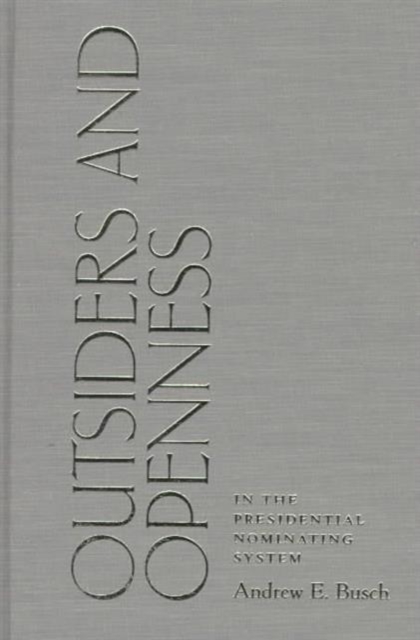
Outsiders and Openness in the Presidential Nominating System (Pitt Series in Policy & Institutional Studies) Hardback
by Andrew E. Busch
Hardback
Description
Ever since the Constitutional Convention, the debate over presidential selection has largely revolved around the question of how open the system should be to outsiders and popular forces.
It's a question that resonates powerfully today -- thanks to the candidacies of Jesse Jackson, Ross Perot, Pat Buchanan, David Duke, and others -- but which has seldom been addressed by rigorous study.In this timely and insightful book, Andrew Busch examines the relationship of outsiders to the presidential nominating system since the late nineteenth century.
Through a series of carefully selected case studies, Busch exposes the nominating apparatus, its changes over time, and its effects on American elections.
He pays particular attention to the nominating "reforms" enacted in the early 1970s, and he studies in depth the campaigns of Estes Kefauver, Barry Goldwater, George Wallace, Eugene McCarthy, George McGovern, Jimmy Carter, Gary Hart, Paul Tsongas, Jerry Brown, Duke, Buchanan, Jackson, and Perot.Busch distinguishes between "movement" outsiders, who are supported by an organized popular movement, and "unconnected" outsiders, who are autonomous, personalist candidates.
He also defines at least three levels of openness: the ability of outsiders to compete, to win a nomination, and to consolidate long-term control of a party.
Taking into account all of these variables, Busch demonstrates that nominating rules can and do make a difference in shaping political parties.
Those making the rules are not faced with a simple decision about whether to provide openness to outsiders, but with a complex set of decisions about what kind of access should be allowed to whom.Outsiders and Openness concludesthat the "reform" system of nominating rules has had the effect of encouraging unconnected outsiders and stacking the deck against popular movements.
Based on these results, Busch argues that American political parties now have a system that reverses the goals of an ideal nominating process, handing the odds to charismatic personalities at the expense of long-term organization."Outsiders and Openness is an outstanding work of scholarship, very carefully and extensively researched, competently written, and imaginatively argued.
The treatments of the Goldwater and McGovern movements are particularly brilliant".
A. James Reichly, Georgetown University
Information
-
Item not Available
- Format:Hardback
- Pages:320 pages
- Publisher:University of Pittsburgh Press
- Publication Date:01/05/1997
- Category:
- ISBN:9780822939764
Information
-
Item not Available
- Format:Hardback
- Pages:320 pages
- Publisher:University of Pittsburgh Press
- Publication Date:01/05/1997
- Category:
- ISBN:9780822939764






